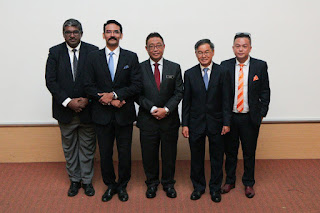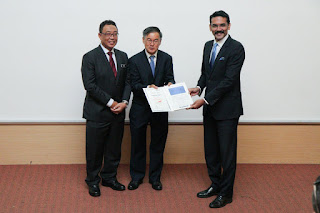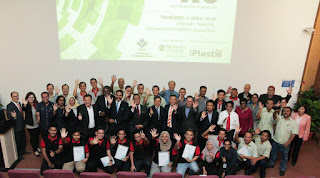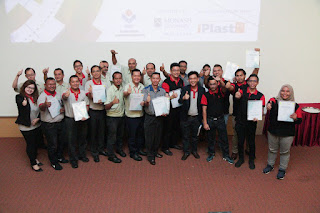MPMA-DOW-SCIENTEX SEES INCREASED WASTE MANAGEMENT AWARENESS IN MELAKA YOUTH
MPMA-DOW-SCIENTEX SEES INCREASED WASTE MANAGEMENT AWARENESS IN MELAKA YOUTH
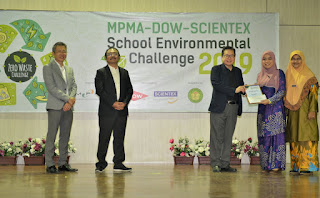
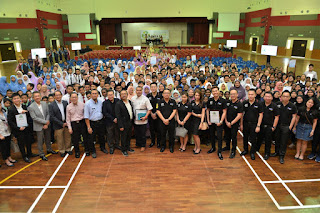
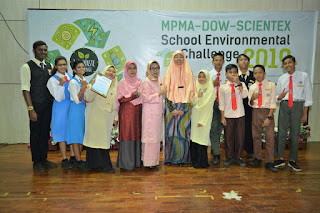
Photo 1: At the Closing Ceremony for the MPMA-DOW-Scientex School Environment Programme 2019.(front row 3rd from left) Dow representative, Mr Yeoh Lian Kuan, Sales Manager, South East Asia, Australia and New Zealand, Infrastructure, Consumer and Transportation, Packaging and Specialty Plastics; (front row 7th from left) Mr. Yau Kuan Yee, Executive Director, Scientex Berhad; (front row 8th from left) MPMA Vice President, Dato’ Raymond Sng
Photo 2: Champion for Primary School SK Bukit Beringin receiving their award from Mr. Yau Kuan Yee, Executive Director, Scientex Berhad . Looking on are from left Dow representative, Mr Yeoh Lian Kuan, Sales Manager, South East Asia, Australia and New Zealand, Infrastructure, Consumer and Transportation, Packaging and Specialty Plastics and MPMA Vice President, Dato’ Raymond Sng.
Photo 3: Champion for Secondary Schools, SMK Naning.
MELAKA, 5 November 2019: The collaborative School Environmental Challenge, organized by The Malaysian Plastics Manufacturers Association (MPMA) with support from Dow Chemical Company and Scientex Berhad, increased the number of participating schools by more than five times since its launch in 2016, signifying a major shift in awareness on the issue of waste management amongst its participating youth.
The programme came to a close with today’s awards ceremony to celebrate the fourth consecutive School Environmental Challenge, awarding 34 schools in Alor Gajah, Melaka Tengah and Jasin, Melaka.
The Zero Waste Challenge, which is part of the overall programme, is designed to encourage students to re-think their relationship with waste.
The Zero Waste Challenge has three elements – an education and awareness component; a #PullingOurWeight clean-up component; and a recyclables collection component. The elements are intended to guide students to understand the benefits of plastics, to address environmental issues related to plastics, and to take actions to manage plastics – through waste separation for recycling.
MPMA Vice President, Dato’ Raymond Sng said, “The underlying principle behind the elements of the Zero Waste Challenge is that only by understanding and practising these elements, can we help reduce waste going to landfills and reduce littering to help prevent plastics from ending up in the environment.”
Dr. Zhang Han, APAC Sustainability Director, Packaging & Specialty Plastics, The Dow Chemical Company said, “We participated in the programme with MPMA in Melaka in 2016 with six schools and just over 500 students. Today, we have five times more schools and a 100-fold increase in the students’ participation rate. We can truly see the impact of students making a conscious effort to clean the environment and practice the 3Rs – Reduce, Reuse and Recycle.”
Mr Yau Kuan Yee, Executive Director, Scientex Berhad added, ‘MPMA and Scientex has a history of school environmental collaborations in Johor, Melaka and Klang Valley. We are proud to return to Melaka with Dow this year. Protecting the environment is everybody’s responsibility and we hope that students continue to practise what they have learnt from the Zero Waste Challenge.’
The MPMA-DOW-Scientex programme kicked-off with a briefing on 24 July 2019 entitled “Why Plastics” that hosted 219 teachers from 217 school in Melaka. The briefing provided science-based information on waste management, focusing primarily on plastics and its impact on the environment. The Zero Waste Challenge was promoted at the briefing, and selected schools signed up to participate in the competition.
The competition required students to undertake; i. An education and awareness talk on plastics waste management; ii. Organise a dedicated day for #PullingOurWeight cleanup activity; and iii. Undertake a campaign on plastics waste management by collecting recyclables.
This year, MPMA expanded the programme module to be more forward-looking which emphasised plastics recycling as a core component of an effective waste management and circular economy. This is in line with its recent white paper titled “An Advanced Plastics Recycling Industry for Malaysia.”
“The basic concepts of circular economy, including the importance of plastics waste management and how recycling plays a key role in our economy are key values that will help preserve the environment for future generations,” Sng added.
SK Bukit Beringin from Alor Gajah won the “Zero Waste Challenge in the Primary School Category” and took home RM5,000. SK Air Baru from Jasin won RM4,000 for second place, while SJKC Notre Dame from Melaka Tengah won RM3,000 for third place.
SMK Naning from Alor Gajah won the “Zero Waste Challenge in the Secondary School Category” and took home RM5,000, SMK Tun Tuah from Melaka Tengah won RM4,000 for second place, while SMK Seri Mahkota from Jasin won RM3,000 for third place.
BUDGET 2020: BUILD AN ADVANCED PLASTICS RECYCLING INDUSTRY TO TURN WASTE INTO WEALTH
BUDGET 2020: BUILD AN ADVANCED PLASTICS RECYCLING INDUSTRY TO TURN WASTE INTO WEALTH
Malaysia needs the right policies and investment framework that will catalyse an advanced plastics recycling industry, to create a new engine of growth for employment and drive a dynamic export sector for Malaysia through turning waste into wealth. A clean, vibrant and healthy plastics recycling industry is needed to support more effective recycling of plastics from Malaysian households and prevent littering which pollutes our environment.
As representatives of the plastics recycling industry, Malaysian Plastics Manufacturers Association (MPMA) and Malaysian Plastics Recyclers Association (MPRA) hope that Budget 2020 will contain allocations for programmes under the Ministry of Housing and Local Government to improve household waste separation, especially the separation of recyclable plastics.
Authorities need to find new ways of reducing and preventing littering, which could be achieved through a small-grant Litter Innovation Fund, for example, under the purview of the Ministry. Small grants could be awarded to spur anti-littering programmes and studies or subsidise infrastructure or equipment. A Litter Innovation Fund has been established in England, UK, to support innovative research projects that have the potential to be scaled up, or applied more widely, with grant recipients required to match a proportion of the funding, and deliver their projects within six months.
Alternatively establishing a fund for projects that encourage more effective separation of households’ recyclable plastic waste would produce more homogenous and higher quality plastic waste streams and reduce contamination. This in turn raises the recovery rate of recyclables and prevents valuable material from being disposed in landfill. Well-designed programmes supported by such a fund would also engage communities and raise awareness of waste reduction and recycling which in turn supports behaviour change among households.
On a related platform, a Circular Economy Fund could be established to accelerate Malaysia’s transition towards a circular economy which keeps resources in the economy through reusing and recycling, instead of being disposed in landfill. Encouraging the use of recycled materials in the making of new products is a core principle of the Circular Economy.
Such a fund would aim to support manufacturers who use recycled plastics and other recycled materials in their products, for example, or incentivise design projects that drive innovation to make recycling easier which in turn raises the value of recyclables, and ensures a higher quality of recyclates.
These and similar measures should be key components to the Dasar Plastik which is to be drafted by the Housing and Local Government Ministry, as a foundation for a sustainable waste management system for Malaysia, thus contributing to Malaysia’s transition to a circular economy.
Meanwhile, the plastics recycling industry itself has recognised the need to escape the lower end of the value chain, and for upgrading the technology it relies on. Aside from a clear regulatory and investment framework, incentives such as a reinvestment allowance for plastics recycling industry would support the development of a clean, advanced and modern industry.
With a large proportion among Malaysian plastics recyclers being small-and-medium-sized enterprises (SMEs), reinvestment allowances would help in obtaining the necessary resources to advance and invest in new technologies and machines in order to compete, and consistently meet the high quality that export markets demand. An increase in the allocation of market development grant would incentivise SMEs to drive their export promotional activities, through attending international exhibitions.
Malaysia needs a sustainable and viable plastics recycling industry to support its industrial and manufacturing sectors, and that means well-designed and effective policies and regulations to strengthen Malaysia’s waste management system and prevent improperly disposed plastics from polluting the environment.
Malaysia is in critical need of wider collaboration, as managing the flows of plastics from cradle to the grave is a multi-stakeholder undertaking. MPMA and MPRA have made a commitment to supporting this collaborative process, as outlined in the joint white paper ‘An Advanced Plastics Recycling Industry for Malaysia’ launched on October 1, 2019. This will support Malaysia’s position as a thriving manufacturing and trading economy, while transitioning to a sustainable recycling nation.
MPMA & MPRA
7 OCTOBER 2019
MPMA PROMOTES INDUSTRY 4.0 THROUGH FIRST-OF-ITS-KIND PLASTICS INDUSTRY CONFERENCE
MPMA PROMOTES INDUSTRY 4.0 THROUGH FIRST-OF-ITS-KIND PLASTICS INDUSTRY CONFERENCE

Connect @ i4.0 Plastics Industry Conference by Malaysian Plastics Manufacturers Association (MPMA), connecting plastics-making entrepreneurs with technology experts [From left to right: Datuk Noraini Soltan, Vice-President of MPMA; Mr Elanjelian, Chief Executive of Human Resources Development Fund (HRDF); Dr Sumitra Nair, Vice-President of Malaysia Digital Economy Corporation (MDEC)]
PUTRAJAYA, 19 SEPTEMBER 2019: Approximately 100 participants attended the Connect @ i4.0 Plastics Industry Conference 2019 at Zenith Putrajaya, today, an event that connects plastics-making entrepreneurs with technology experts on creating smart factories through digitalisation, advanced manufacturing, robotics, under Industry 4.0.
This one-day conference, attended by mostly by small-to-medium enterprises (SMEs), is the first-of-its-kind by Malaysian Plastics Manufacturers Association (MPMA) in effort to foster an advanced and innovative industry that embraces Industry 4.0 in plastics manufacturing.
MPMA brought together representatives from Ministry of International Trade and Industry (MITI) and Malaysia Digital Economy Corporation (MDEC) for sessions with participants, and presented case studies by local and foreign companies on ‘Smart Factory and Automation’ as well as ‘What You Need to Lead in i4.0 – Talent Development’.
“Embracing Industry 4.0 is no longer a choice. The industry is grappling with rising operational cost, domestic labour crunch, increased levels of product quality and consistency, and more efficient production operations among others,” said Datuk Noraini Soltan, the Vice-President of MPMA.
“In the face of these challenges, it is crucial for all of our industry players to advance our manufacturing model into one that offers more innovation-based and high-value production, to enhance efficiency and capture long-term competitiveness at the global level,” she continued.
Through this Conference, participants are able to understand how to digitalise their processes, explore the technology and innovation available and meet experts who would be able to guide them in the process.
MPMA also sponsored representatives and students from government and private training institutions to join the Conference.
“This experience will give them exposure on what is happening and future advancement for the industry. The whole idea is for them to input back what is learnt into the education system,” she added.
The papers presented will cover topics such as robotic solutions for plastics-based industries, material handling automation, vision technology systems, production optimisation, workforce transformation as well as intelligent factories vs intelligent people.
Digitalisation, advanced manufacturing, robotics, additive manufacturing are just a few of the technologies taking the industry toward industry 4.0/the Smart Factory. What does this mean for the plastics industry? What are the benefits and how does it all come together? These are some of the questions the Conference will seek to address and provide first-hand knowledge from industry leaders who are working to achieve smart manufacturing practices.
MPMA has been strongly promoting industry 4.0 models to its members through numerous initiatives. MPMA was the first association to introduce the concept of a smart factory to its members at the Conference on Future of Innovation for the Plastics Industry in 2015. More recently, it organised the industry 4.0 technical training courses, “First Step to Injection Moulding 4.0”. The course saw a group of 100 technicians and engineers through a 12-month pilot programme that was completed in November 2018.
MALAYSIA NEEDS COMPREHENSIVE SOLUTIONS TO ADDRESS PLASTICS THROUGHOUT ITS LIFE-CYCLE
MALAYSIA NEEDS COMPREHENSIVE SOLUTIONS TO ADDRESS PLASTICS THROUGHOUT ITS LIFE-CYCLE
MALAYSIA needs a circular economy approach to waste management where waste can be a resource and materials can have an extended lifecycle by being properly recycled.
Rampant illegal dumping, gone unchecked for years such as on the land in Sungai Petani that has been seized by the Kedah government recently shows that our country’s policy framework and infrastructure for materials recycling is incomplete and needs realignment.
To help curb pollution, Malaysia needs a healthy recycling industry that can cope with the rising affluence of its population and the corresponding increase in all recyclables, not just plastics, to be recovered from the solid waste generated.
Recycling is not only vital in protecting the environment and properly managing and disposing of waste, it is crucial to creating new value that benefits society and contributes to sustainability. Waste plastics such as automotive parts or computer peripherals like keyboards that are generated by production overruns can be recycled to add new value and promote sustainability in various industrial sectors.
A healthy recycling industry needs effective sorting facilities or Material Recovery Facilities where separated recyclables are sorted into waste streams. It is vital to sort separated recyclables into more specific waste streams to produce higher grade feedstock which are more in demand for recycling into new products.
To illustrate, uncoloured glass and PET bottles are more valuable than coloured, and glass and PET bottles sorted by colour are more valuable than mixed colours.
Clear regulatory and investment framework is crucial to encourage the desired transformation into a high value, advanced, automated, clean and compliant industry. Currently, opaque regulations and fluid policy directions are hurting investments in the recycling sector as investors are unsure of economic viability.
Recyclable plastics should not be buried in landfill, where they are lost as a resource instead of being used over and over.
A clean and vibrant plastics recycling industry would be a new engine of growth for employment and exports. In addition to supporting Malaysia’s industrial and manufacturing sectors, a sustainable and viable plastics recycling industry contributes to reducing pollution.
We fully support Government efforts to escalate enforcement against illegal dumping such as that found in Sungai Petani, and against smugglers who make false declarations to Customs in order to illegally import ‘sampah plastik’.
We also support the clamp-down on illegal recycling operations, with about 150 of these shut down by the Government to date.
We continue to support and are ready to assist the Government in efforts to crack down on unscrupulous and illegal operators and to protect the environment.
We also call for a proper forum to discuss a robust, effective regulatory framework for this industry and Malaysia’s role in the circular economy where the redeployment and reuse of resources is a key organising principle.
MPMA & MPRA
1 AUGUST 2019
G20 OSAKA BLUE OCEAN VISION IS A STEP FORWARD FOR THE ASIAN PLASTICS INDUSTRY IN THE FIGHT AGAINST MARINE LITTER
G20 OSAKA BLUE OCEAN VISION IS A STEP FORWARD FOR THE ASIAN PLASTICS INDUSTRY IN THE FIGHT AGAINST MARINE LITTER
The Asia Plastics Forum (APF) welcomes the G20’s call for the world to unite in the fight against marine litter under a common global vision of the Osaka Blue Ocean Vision, and recognising that the key lies in reducing plastic litter through improved waste management. Effective waste management closely supported by a strong recycling industry is the way forward towards implementing an effective and efficient Circular Economy model which recognizes the important role of plastics for society.
As the secretariat of APF, the Malaysian Plastics Manufacturers Association (MPMA) applauds this effort which is in line with the plastics industry’s view that littering has resulted in plastic debris in the marine environment. Plastics do not belong in the world’s oceans and should not be littered – plastics should be responsibly used, reused, and recycled.
Japan’s leadership on this matter in the G20 is reflected by initiatives such as the Japan Initiative for Marine Environment (JaIME) for Asian emerging countries to observe and experience Japan’s Plastic Waste Management system as a model for a more sustainable future.
For over 10 years, APF has provided a platform for Asian countries to address sustainability issues affecting the plastics industry, especially on plastics litter.
ASIA PLASTICS FORUM (APF)
2 JULY 2019
FOCUS ON SMUGGLERS AND ILLEGAL OPERATIONS, NOT LAW-ABIDING RECYCLERS
FOCUS ON SMUGGLERS AND ILLEGAL OPERATIONS, NOT LAW-ABIDING RECYCLERS
IN calling for another blanket ban, the Consumer Association of Penang (CAP) is hurting law-abiding and licensed manufacturers and businesses in Malaysia instead of focussing on smugglers and illegal operators.
A blanket ban would hurt plastics recyclers who have complied with the law and the existing regulatory framework and could drive them out of business. Instead of punishing smugglers and lawbreakers, it is the employees and their families who would be penalised through losing their livelihoods.
If legal plastics recyclers go out of business, it would hurt the environment as well because legal plastics recyclers also recycle Malaysia’s own domestic plastics waste. Recycling plays a vital role in protecting the environment and properly managing and disposing of waste.
As an economic activity, recycling is crucial to creating new value that benefits society and contributes to sustainability. Legal operators support Malaysia’s manufacturing and export sectors in industries such as electrical and electronics, automotive and others. A total ban would bring Malaysia’s participation in the global circular economy to a halt.
The Malaysian Plastics Manufacturers Association (MPMA) and the Malaysia Plastics Recyclers Association (MPRA) would like to point out that the Malaysian government has not allowed imports of ‘sampah plastik’ since 2008.
All law-abiding plastics recyclers have complied with this ban, which means ‘sampah plastik’ from overseas was smuggled into Malaysia and illegally imported. We hope the continuing debate will focus on the more immediate problem of how to properly dispose of existing ‘sampah plastik’ and prevent future smuggling. This would be more productive than harming legitimate businesses which have not broken the law.
We reiterate our stand that Malaysia has no place for other countries’ rubbish, and that we should not become the developed world’s dumping ground. We continue to support and are ready to assist the Government in their efforts to crack down on these unscrupulous and illegal operators and to protect the environment.
We will continue to work with relevant government authorities to properly discuss a robust, effective regulatory framework for this industry and Malaysia’s role in the circular economy where the redeployment and reuse of resources is a key organising principle.
MPMA & MPRA
20 JUNE 2019
BLANKET BANS ARE NOT A SOLUTION TO STOP SMUGGLING
BLANKET BANS ARE NOT A SOLUTION TO STOP SMUGGLING
HASTY calls by non-governmental organisations for a blanket ban on so-called “plastics waste” are unnecessary, ill-considered, and harm law-abiding manufacturers and businesses in Malaysia.
In referring to “plastics waste”, NGOs are lumping permitted imports together with smuggled ‘sampah plastik’. This hurts the reputation of legitimate Malaysian businesses, instead of addressing the issue of smuggling.
We are concerned that law-abiding businesses are being accused of breaking the law, and that inaccurate statements could destroy the livelihoods of law-abiding Malaysians and the families and loved ones that they support.
The Malaysian Plastics Manufacturers Association (MPMA) and the Malaysia Plastic Recyclers Association (MPRA) would like to point out that ‘sampah plastik’ from overseas has been banned meaning any such wastes in Malaysia are smuggled and illegally imported. Blanket bans do not and cannot address the issue of smuggling and do hurt legitimate businesses.
We worry that there could be a repeat of the suspected arson attack in Kedah that recently destroyed a licensed and legal factory, and put the lives of workers, local residents, and firemen at risk.
Recycling done by legal operators are supporting both local and foreign brands in sectors such as electrical and electronics, automotive and other manufacturing sectors as well as in the construction industry. A total ban would bring Malaysia’s participation in the global circular economy to a halt.
Recycling plays a vital role in protecting the environment and properly managing and disposing of waste. As an economic activity, recycling is in fact crucial to creating new value that benefits society and contributes to sustainability.
We fully support the Government’s efforts to escalate its enforcement actions against smugglers, who make false declarations to Customs in order to illegally import ‘sampah plastik’. We also support the clamp-down on illegal recycling operations, with about 150 of these shut down by the Government to date.
We reiterate our stand that Malaysia has no place for other countries’ rubbish, and that we should not become the developed world’s dumping ground. We continue to support and are ready to assist the Government in their efforts to crack down on these unscrupulous and illegal operators and to protect the environment.
We also call for a proper forum to properly discuss a robust, effective regulatory framework for this industry and Malaysia’s role in the circular economy where the redeployment and reuse of resources is a key organising principle.
MPMA & MPRA
29 MAY 2019
PRICEWORTH TO RESTART PLYWOOD MILL WITH LOG RETURN
PRICEWORTH TO RESTART PLYWOOD MILL WITH LOG RETURN
KOTA KINABALU, 14 MARCH 2019: PRICEWORTH International Bhd (Priceworth) expects to restart operations at its plywood mill in Sandakan soon,
having secured the return of about 11,000 cubic metres of logs from the Sabah Forestry Department (SFD).
“We will be able to restart operations at Sinora’s plywood mill in Sandakan with the return of these logs, while we continue working on the completion of our
acquisition of FMU5,” said Priceworth executive director Richard Koo.
The timber and forest plantation group said it has agreed to pay the royalty, premium, conservation fee and related costs for a total of 11,098.78 cubic metres of logs.
“We would like to take this opportunity to thank the Sabah State Government and the Sabah Forestry Department for allowing us to pay by 11 instalments in 2 months from the date of their letter dated yesterday,” said Priceworth executive director Richard Koo.
“Meanwhile, we will continue to engage with the Sabah Forestry Department on resuming harvesting operations at FMU 5,” added Koo.
“With the resumption of harvesting, we would be able to focus on supporting the state government’s policy of encouraging more high-value downstream industries,” he said.
Priceworth is working on expanding its downstream operations with a new line for the production of container flooring. A sustainable supply of raw material is one of the most pressing issues preventing downstream timber players in Sabah from contributing higher value-added products to the state’s exports.
Priceworth halted harvesting operations in July 2018 following inspections by the Sabah state government’s Special Task Force.
MALAYSIA’S FIRST INDUSTRY 4.0 TRAINING COURSE FOR THE PLASTICS INDUSTRY SEES 100 PIONEER GRADUATES
MALAYSIA’S FIRST INDUSTRY 4.0 TRAINING COURSE FOR THE PLASTICS INDUSTRY SEES 100 PIONEER GRADUATES
Photos Captions:
Photo 1 : Championing Industry 4.0 for plastic industries. From left to right: Prof Mahendhiran, Vice-President R&D of Monash University Malaysia & Chief Executive Officer of Monash R&D Sdn Bhd; Elanjelian Venugopal, Chief Executive of Pembangunan Sumber Manusia Berhad; Tn Hj Suimi Bin Abdul Majid, Deputy Director-General of Department of Skills Development of Ministry of Human Resources; Datuk Lim Kok Boon, President of MPMA and Anston Tan, Principal of iPlast4.0 Sdn Bhd.
Photo 2 : Datuk Lim Kok Boon (center), President of MPMA presenting a token of appreciation to Elanjelian Venugopal, Chief Executive of Pembangunan Sumber Manusia Berhad alongside Tn Hj Suimi Bin Abdul Majid (left), Deputy Director-General of Department of Skills Development of Ministry of Human Resources
Photo 3 : Proud pioneer graduates of the First Step to Injection Moulding 4.0 (FSIM4.0) pilot programme from four companies – LH Plus Sdn Bhd, Mah Sing Plastics Industries Sdn Bhd, Plasform Sdn Bhd and Triplus Industry Sdn Bhd.
Photo 4 : Pioneering the future of plastics industry. Datuk Lim Kok Boon (center), President of MPMA together with the VIPs, CEOs and pioneer graduates of the First Step to Injection Moulding 4.0 (FSIM4.0) pilot programme.
KUALA LUMPUR, 4 April 2019: A group of 100 technicians and engineers from the Malaysian plastics industry have completed Malaysia’s first Industry 4.0 training course, under a 12-month pilot programme organised by the Malaysian Plastics Manufacturers Association (MPMA).
This pioneer batch graduated from MPMA’s First Step to Injection Moulding 4.0 (FSIM4.0) programme that ran from September 2017 to November 2018. The graduation ceremony was held today at the Plenary Theatre of Monash University Malaysia.
Comprising of four different courses, MPMA’s FSIM 4.0 was supported by a RM2.9 million grant from Pembangunan Sumber Manusia Berhad (PSMB) under its InBase Scheme. The programme aims to upskill those working in Malaysia’s plastics industry, and help Malaysian plastics manufacturers stay competitive through achieving operational excellence.
The four courses offered in the FSIM4.0 programme are: Scientific Moulding; First Step to Smart Manufacturing; Smart Maintenance; as well as Lean and Robot Based Automation. Each course consists of five modules and each module requires five days of training.
Three participants underwent all four courses of which two clocked in outstanding achievement by successfully completing and achieving competency in all four courses.
The most important course was Scientific Moulding which saw participation from 45 candidates, out of which 22 successfully passed all five modules. Scientific Moulding is critical as it is the core activity of an injection moulder and equips candidates with the know-how to run efficient and stable processes, ultimately enhancing production efficiency and quality in plastics manufacturing.
“We congratulate this pioneer batch of FSIM 4.0 graduates, who are proof that Malaysia can produce top notch human capital and highly skilled workers,” said Datuk Lim Kok Boon, President of MPMA.
“We must continue supporting our people by equipping them with new, invaluable skills they will need to further their careers. This in turn will contribute to significant economic impact and high-value job creation in the medium to long term,” he added.
Malaysia is one of ASEAN’s top exporters of plastic products, with about 50 percent of production directly exported as finished products. The industry must be able to compete internationally with clients who demand high-quality products.
“MPMA’s next step would be the launch of the Training Factory – a component of the Centre of Excellence. The objective of the Training Factory is to prepare a steady stream of trained workforce who is ready to enter and contribute to the industry,” said Datuk Lim.
The companies whose employees attended FSIM4.0 also applied for grants from the Malaysian Investment Development Authority’s (MIDA) Domestic Industry Strategic Fund (DISF) to obtain equipment. The four participating companies were LH Plus Sdn Bhd, Mah Sing Plastics Industries Sdn Bhd, Plasform Sdn Bhd and Triplus Industry Sdn Bhd.
MPMA has been leading the way in championing Industry 4.0, and supporting the Malaysian government’s initiative to raise the country’s technical capabilities in order to advance into automated and digitized manufacturing.
In 2012, the MPMA Talent Development Programme (TDP) kicked off with the support of a RM3 million grant from the Economic Planning Unit under the Prime Minister’s Department. The objective was to create a pool of knowledge-based technicians and engineers with the capabilities to drive the industry to the future.
TDP was a resounding success and through judicious spending and very careful cost control, MPMA managed to stretch the RM3 million grant to train a total of 384 workers and 18 trainers. The number of workers trained is almost 75% higher than the original target of 220 workers. TDP covered modules in injection moulding, blow moulding and film extrusion processes.
FSIM4.0 was launched by MPMA in 2017 upon concluding the TDP. In the same year, MPMA also collaborated with Monash University Malaysia in an initiative called the Malaysian Plastics Industry Skills Needs Study. The study serves as a key reference for industry stakeholders to assess current and future skills needs.
“We look forward to the continued support of government in the form of training grants, soft loans for equipment upgrading. Malaysia has a chance to stay ahead of the curve because of this support,” said Datuk Lim.
马来西亚塑料制造商协会 (MPMA) 与马来西亚塑料回收协会 (MPRA) 媒体声明 地球日:可持续发展的回收贡献
马来西亚塑料制造商协会 (MPMA) 与马来西亚塑料回收协会 (MPRA) 媒体声明
地球日:可持续发展的回收贡献
吉隆坡4月23日马新社讯 – 马来西亚塑料行业欢迎和支持政府决心确保环境保护与马来西亚的实际发展结合,就如首相敦马哈迪医生于2019年4月20日在吉隆坡纪念碑公园举行的世界地球日庆祝活动上致词时指出 。
作为负责任的厂家、马来西亚塑料制造商协会(MPMA)与马来西亚塑料回收协会 (MPRA) 的成员,这就是我们支持循环经济模式的原因,其中资源的重新部署和再利用是一个重要的组织原则。
回收在保护环境和妥善管理及处理废弃物方面发挥着重要作用。作为一项经济活动,回收创造出有益于社会并有助于可持续发展的新价值。
马来西亚房屋及地方政府部长祖莱达(Zuraida Kamaruddin)最近引入了一个新的框架,有18个新标准,以确保合法回收行业遵守不伤害环境的负责任做法。
也就是说,我们认为马来西亚没有必要去接受他国的垃圾,我们不应该成为发达国家的垃圾倾销地。
本地和国际地球日报道强调,美国和澳大利亚等发达国家现在才意识到他们一直在向东南亚(尤其是马来西亚)出口家庭和城市垃圾。
马来西亚政府严厉打击猖獗的海外家庭和城市垃圾走私进入马来西亚,以及那些处理走私垃圾的非法经营者。自去年7月以来,杨美盈部长领导的能源、科技、环境及气候变化部已关闭了150多家非法经营的公司。
我们将继续支持并准备协助政府打击不法和非法的经营者以保护环境。
马来西亚塑料制造商协会 (MPMA)
马来西亚塑料回收协会 (MPRA)

